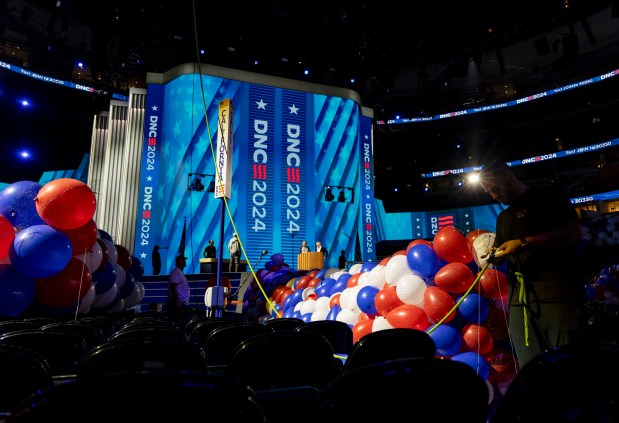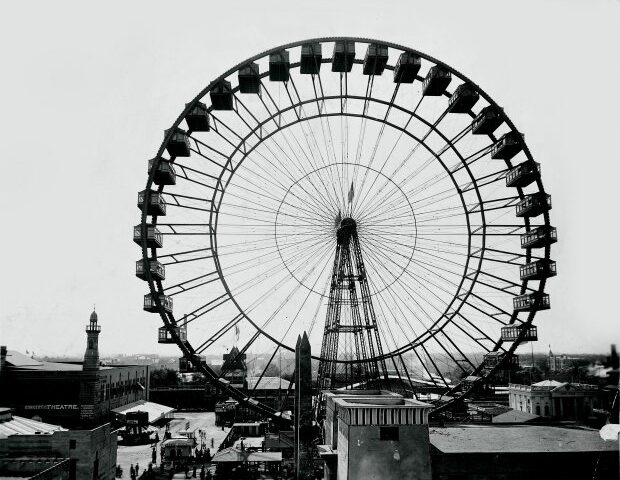More than a year after Chicago was announced as the host city, the Democratic National Convention has begun.
Running through Thursday, the convention is a huge moment for national Democrats, who have had a whirlwind few weeks since President Joe Biden quit the race, paving the way for Vice President Kamala Harris to become the first Black and Asian American woman to lead a major party ticket.
Eyes are also on Mayor Brandon Johnson and Gov. JB Pritzker, who are looking to pull off the massive made-for-TV event without a hitch, building on the success of the 1996 Democratic convention and continuing to push aside historic images of the contentious 1968 DNC.
And yes, the festivities are starting to disrupt the routines of anyone near the convention’s two main venues, the United Center and McCormick Place.
Here’s what to know.
What’s expected at the convention?
Traditionally, party leaders come together every four years to nominate the person they want on the top of the presidential ticket in November. Republicans held their convention last month in Milwaukee.
There are a few nontraditional things about this year’s DNC, though.
Typically, the person nominated emerged victorious through primary elections across the country in spring and summer. This year is different for Democrats since Biden dropped out of the race in July.
Harris, Biden’s vice president, has already been nominated in an online roll-call of delegates to be the Democratic nominee, so there won’t be a formal, official vote to nominate her at the convention.
Instead there will be a ceremonial roll call, speeches from party leaders and up-and-comers, and an introduction of Harris’ recently announced running mate, Minnesota Gov. Tim Walz. It’ll be a televised rally of support to build on Harris’ fundraising and polling momentum from the past month.
- Amid talk of unity, DNC opens in Chicago with diverging themes
- Don’t expect a balloon drop quite yet. How the virtual roll call to nominate Kamala Harris will work
- Kamala Harris has little-known childhood connection to Illinois; family friend recounts memories from her year in Champaign-Urbana
Who will be there, and what’s the schedule of events?
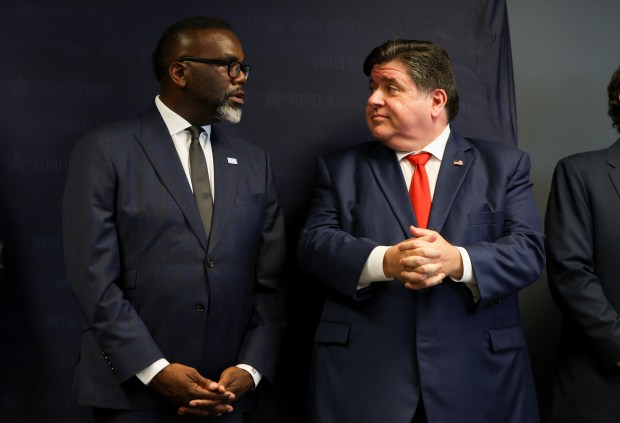
Nearly all of the Democratic Party’s well-known officeholders are joining thousands of delegates and other supporters and volunteers, along with thousands of members of the media, at the main venues: McCormick Place, south of the Loop, and the United Center on the Near West Side. In addition, some of the thousands of expected protesters started to take to the streets over the weekend to bring attention to issues that include the war in Gaza.
There will likely also be some A-list celebrity sightings at the convention sites and around town. Billie Eilish and Julia Louis-Dreyfus took part in Democrats’ last national convention, which was primarily virtual due to the pandemic.
Overall, the DNC previously estimated some 50,000 visitors will come to Chicago for the convention.
Convention events at the United Center and McCormick Place are not open to the public.
Much of the schedule has yet to be announced, although Pritzker, expected to speak Tuesday, and former President Barack Obama are among those that figure to have prominent slots. Daytime party business and meetings will largely take place at McCormick Place, according to the DNC. Evening events, including the major speeches and hoopla that is likely to be televised, will be at the United Center.
Biden was expected to be the headliner Monday. Harris will give a closing speech on Thursday, with Walz expected to speak Wednesday.
- What to do in Chicago during the Democratic National Convention: Our 35 critic’s picks
- Food guide: Where to go for a taste of democracy during the Democratic National Convention in Chicago
What is the city doing to prepare?
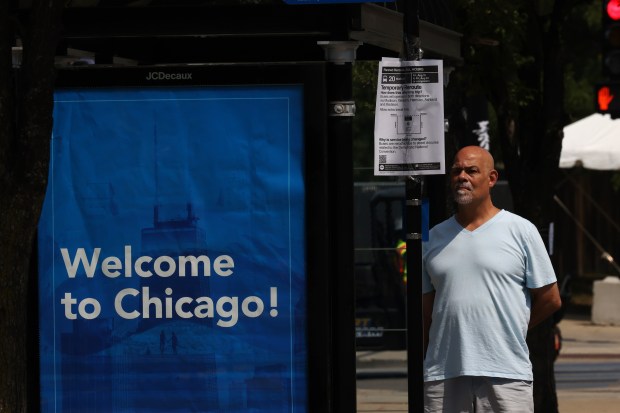
Residents are advised to download the OEMC Chicago app for the latest updates about disruptions around the United Center and McCormick Place.
Ivan Capifali, acting commissioner of Chicago’s Office of Business Affairs and Consumer Protection, said nearly 1,400 businesses had been contacted in initial canvassing. Establishments closer to the venues had been canvassed again in the past few weeks, he said.
Along with logistics for the convention itself, Johnson has said the city is prepared for the possibility that thousands of migrants could arrive from the southern border, sent by Republican Texas Gov. Greg Abbott and others.
More recently, the city’s top official on migrant issues has walked back expectations for a major migrant surge. No migrant buses have arrived in Chicago since June, according to a spokesperson for the city Department of Family and Support Services.
Police Superintendent Larry Snelling has stressed that the department has undergone rigorous training on both crowd control and First Amendment issues.
City workers have spent months beautifying downtown and making preparations across the city, from sidewalk repairs to new signs and better lighting.
- All eyes will be on Chicago this week. Can the DNC help reverse the city’s national narrative?
- Chicago will be Convention City again in 2024. Take a look back at its history as a host.
- Kamala Harris’ move to the top of the ticket gave DNC hotel bookings in Chicago a boost, but don’t expect Taylor Swift-level crowds
What is the plan for protests?
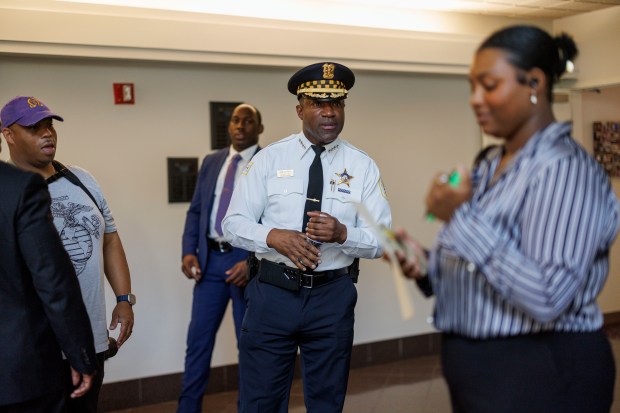
Hundreds of protesters calling attention to abortion rights, LGBTQ+ rights and Palestinians in Gaza marched downtown Sunday, the first major day of demonstrations tied to the convention.
For those held this week by the convention venue, Johnson’s administration proposed that many protesters march west from Union Park, past a small park north of the United Center and then east back to Union Park. Officials announced the route after a coalition of pro-Palestinian protest groups sued to block the city from confining protesters to a two-block strip of Grant Park, far from the United Center.
U.S. District Judge Andrea Wood ruled that she would not force City Hall to widen and lengthen the authorized route, as some protesters had sought.
Park No. 578 just north of the United Center will also serve as a “free speech zone,” Glen Brooks, director of community policing at the Chicago Police Department, said.
Chicago is getting set for DNC protests. Here’s a rundown of what to expect.
On Friday, following last-minute complaints from protesters and negotiations with the city that were ultimately settled after Mayor Johnson himself intervened, the city allowed for a stage and a sound system for two rallies in Union Park.
The latest information about protest routes will be communicated through the OEMC app, Brooks said.
- DNC protest groups cry foul after city denies permits for stage and sound system at rallies near United Center
- Federal judge refuses to grant changes to DNC protest route: ‘This falls well short of a First Amendment violation’
- Mayor Brandon Johnson personally intervened on behalf of protest groups over stages, sound system for Union Park rally, organizer says; ‘We talked directly to the mayor’
What areas will be most affected?
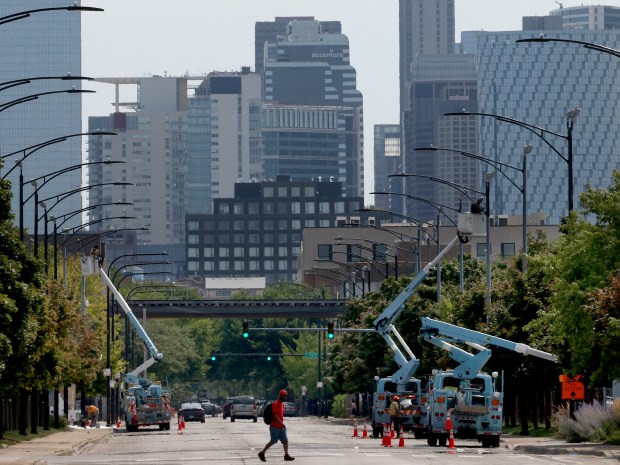
The neighborhoods immediately around the United Center and McCormick Place are most affected, and the security perimeter is set. Full street closures in the security zones have occurred. A pedestrian-only zone around the United Center stretches between approximately Washington Boulevard on the north to Adams Street on the south, and from Seeley Avenue on the west to a point between Wood and Paulina streets on the east.
Only people with credentials who “have a need to be there” will be allowed in that zone, 2024 DNC coordinator Jeff Burnside said in the weeks leading to the convention.
A vehicle screening zone around the United Center extends east and south of the pedestrian-only zone by about a block.
McCormick Place also has a “red zone” for pedestrians surrounded by high fences, and a slightly larger vehicle screening zone to the east, west and north. That larger zone is outlined roughly by Michigan Avenue, 21st Street and the Stevenson Expressway.
The restrictions at McCormick Place took effect at 10 p.m. Friday. The zone around the United Center took effect at 7 p.m. Saturday, with streets in the area expected to reopen Aug. 23.
There will be traffic aides from OEMC in the areas most affected, OEMC spokesperson Mary May said.
- The DNC will flood downtown Chicago with visitors. But will employees go to their offices?
- Some business owners and residents near United Center, home to upcoming DNC, want nearby migrant shelter moved
- DNC cleanup aims to improve Chicago beyond the convention, but also echo 1996 efforts
- At a tense time in American politics, Chicago hospitals prepare for Democratic National Convention
How will the convention affect traffic and public transit in the city?
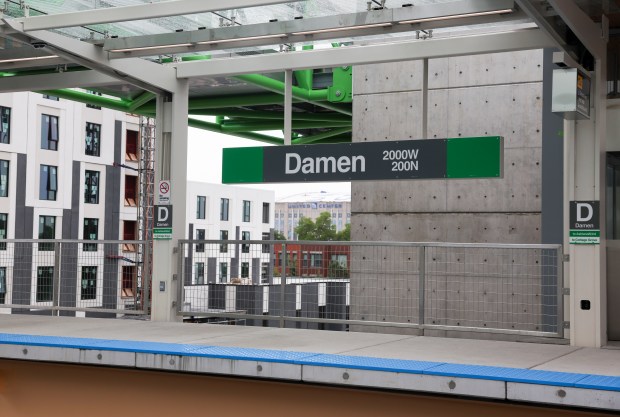
Public transit riders should expect delays as buses are rerouted on streets near the convention sites. No significant extra train service will be added, CTA President Dorval Carter has said, though passengers might see additional trains from airports. The CTA earlier this month celebrated the long-awaited opening of its new Damen Green Line station near the United Center ahead of the convention.
Some parking spaces near the venues but outside the security zone are affected. Restrictions, particularly around McCormick Place, were put in place in the week leading up to the convention, according to the DNC while others took effect the weekend before the event.
Limited street closures started Sunday near the Magnificent Mile and in Gold Coast. The streets around The Talbott Hotel and Waldorf Astoria near Delaware and State were shut down as part of those closures; the Waldorf Astoria was listed as a venue on the DNC website.
The DNC has directed residents to the OEMC website or app and posted restrictions for updates on what parking spots will be blocked.
Bikes will be allowed in the outer vehicle-swept areas but not within the pedestrian-only security zones.
Traffic has also been disrupted on the eastern end of I-55. Between DuSable Lake Shore Drive and State Street, no vehicles larger than a passenger car will be permitted while the security zone is in effect. The exit to MLK Boulevard from the expressway will be closed to general traffic.
On the Kennedy Expressway, center lanes will remain closed to the general public due to ongoing construction but could be used for motorcades or law enforcement vehicles.
Other street closures may occur, officials have said.
CPD’s helicopters will be in use throughout the week “to support neighborhood and district operations,” according to Brooks. The Secret Service will also likely fly drones or helicopters along with motorcades.
Metra is running hourly shuttles between O’Hare International Airport and downtown during the convention, and the CTA committed to providing buses to specifically transport people participating in the convention.
- The DNC will bring increased police to the CTA, Metra — but no plans for previous stringent measures, for now
- How will CTA handle the Democratic National Convention crowds? ‘I’m very concerned’
- The DNC will bring closed streets, CTA changes and possibly a new station. Here’s how it will affect residents and commuters getting around Chicago.
What are the plans for televised coverage?
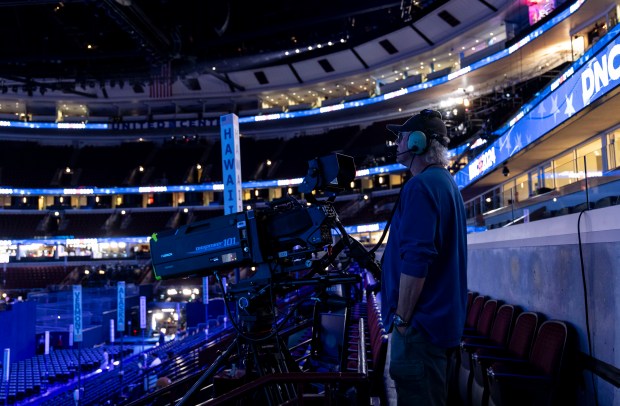
Cable news channels will likely carry much of the top prime time programming live. Fox News, CNN and MSNBC will all have top anchors present at the convention, with Bret Baier and Martha MacCallum anchoring for Fox and Jake Tapper and Anderson Cooper broadcasting from the United Center for CNN.
The DNC will broadcast its own feed on social media and its website, DemConvention.com, as well as on Amazon Prime Video. The major networks are expected to offer prime time coverage. Events will also be available through streaming services.
“The Late Show with Stephen Colbert” plans to broadcast from the Auditorium Theatre downtown throughout the week of the DNC — suggesting the Emmy-winning, formerly Chicago-based comedian and Northwestern University alum plans to host guests from the United Center on his late-night show.
Comedy Central’s “The Daily Show” will also broadcast from Chicago during the convention, including a live show Aug. 22.
- How and when to watch the DNC, including all the streaming options
- Former Mayor Lightfoot to join CBS 2 Chicago as TV analyst for DNC
- Chicago DNC host committee says it has raised a record $94 million
How many political conventions has Chicago hosted?
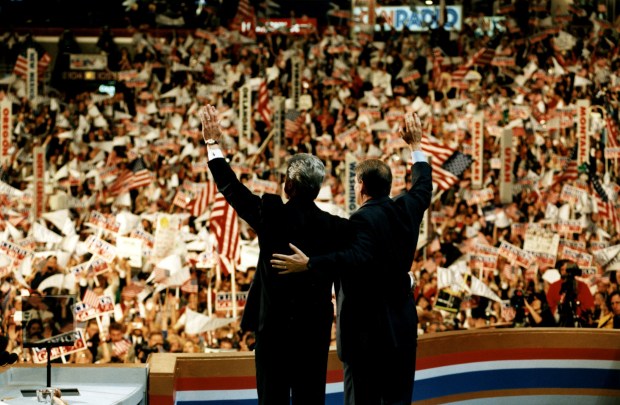
Chicago has hosted 25 major party national conventions, 14 for Republicans and 11 for Democrats, since 1860, when Abraham Lincoln was nominated by Republicans, according to the Chicago History Museum. That’s the most of any U.S. city, with the runner-up, Baltimore, having hosted 10.
- The mayhem of the 1968 Democratic Convention in Chicago
- At the 1944 Democratic convention in Chicago, an ailing FDR faced a difficult choice
- A ‘Boy Orator’ brought down the house at the 1896 Democratic Convention in Chicago
- Chicago’s history with hosting Democratic and Republican conventions dates back to 1860
- How Chicago became the go-to city for political conventions
Chicago Tribune’s A.D. Quig contributed.


